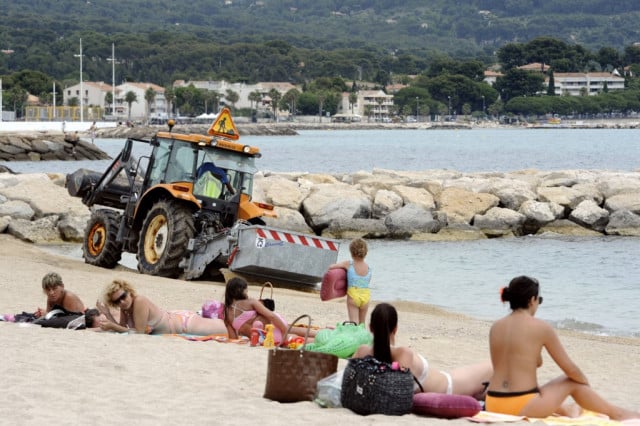For a brief period on Tuesday, the hashtag #seinsnus – bare breasts – was trending on Twitter in France, with hundreds of people leaving their comments on this French summer tradition.
The chat was in response to an incident in the coastal resort of Sainte-Marie-la-Mer in south west France, near Perpignan, where two gendarmes had apparently approached several women who were sunbathing topless on the beach and asked them to cover up.
The mairie confirmed to local media that the incident had happened, saying the gendarmes acted on a request from a family who were also on the beach.
But would the women have been within their legal rights to refuse to cover up?
This is what French law says
Topless women
If you are on a beach, there is nothing in national law to prevent women going topless or wearing the 'monokini' – bikini bottoms only.
However some municipalities have brought in their own local decrees banning the monokini or thong. These should be sign-posted, and flouting the regulation can earn you a €38 fine.
Among the places where going topless is banned are the Paris plages – the urban beaches that pop up in the capital every summer.
For a variety of reasons – from skin cancer to fears of being filmed on mobile phones – French women are increasingly less likely to go topless.
Away from the beach going topless in public is generally not allowed unless you are in a designated area – such as a nudist colony or Paris' short-lived nudist restaurant – or a designated event.

Femen activists frequently demonstrate topless as an act of disobedience. Photo: AFP
Topless men
Men are allowed to be topless on any beach because apparently their nipples are less shocking than female ones, but once you get away from the seaside there are some restrictions.
Again there is no national law covering this – the law that banned men from appearing topless in public was repealed in 1994 – but some local authorities have brought in restrictions for towns that order men to keep their tops on.
For example those who decide to go shirtless in the town of Trouville-sur-Mer on the Normandy coastface fines of up to €17 while at La Grande Motte, a popular seaside resort in the southern French region of Occitanie this penalty jumps to €60.
Private businesses are also within their rights to refuse entry to bare-torsoed men.
Fully nude
If baring your top half only is not enough, there are plenty of places in France where nuturism is practised. However if you're going to do this you need to be sure that you are in a designated area as you cannot strip off on all beaches.
READ ALSO Why foreigners flock to France to let it all hang out
There are designated nudist resorts and even whole villages such as the famous Cap d'Agde on the Riviera, as well as plenty of beaches where being nude is accepted – these will usually be signposted.
Away from the beach it's a little more complicated. Although there is no specific law against being nude in public in France, there is a law against disturbing public order, which can be used for people who are naked in public and refuse to cover up when asked.
“The first rule for any naturist is to respect other people,” Jacques Freeman of the Association for the Promotion of Naturism in Liberty (APNEL) previously told The Local. “And it's really important not to be confrontational about your choice to be nude, for example if your neighbours don't like you sunbathing naked in the garden.”
For more on how and when to practice naturism in France – click here.
Wearing too many clothes
As well as rules on what you can take off, there are rules about what you can put on, although again these mostly apply to women (that might be the patriarchy). The full-body swimsuit known as the burkini is banned at most municipal swimming pools.
Whether it's allowed on beaches has been the subject of several years of controversy and high-profile legal battles after some local authorities attempted to ban it on the beach, although in the end the local bans were overturned by the courts.



 Please whitelist us to continue reading.
Please whitelist us to continue reading.
Member comments